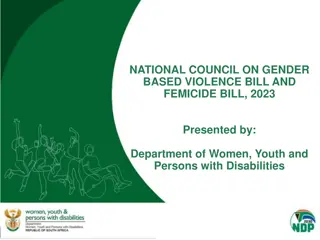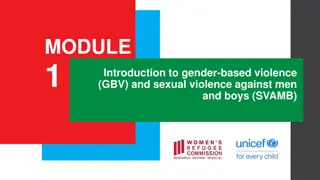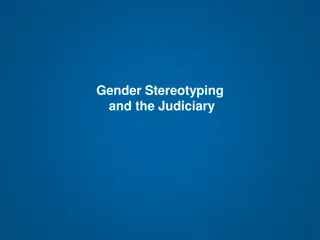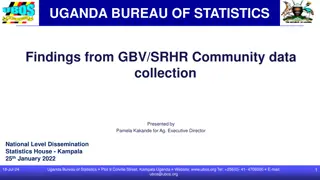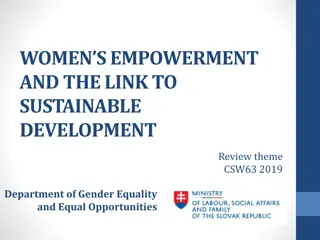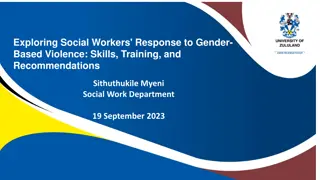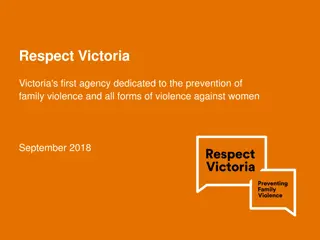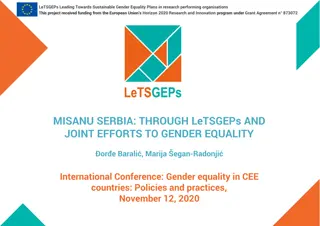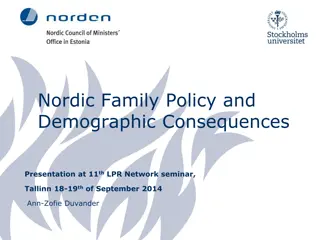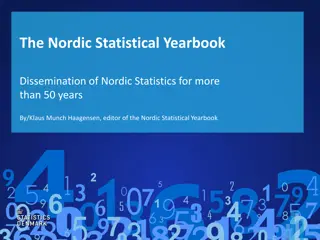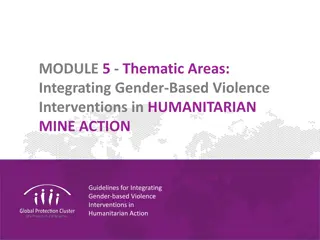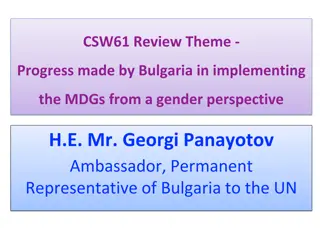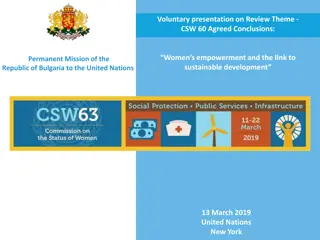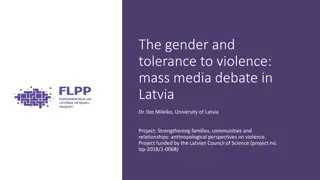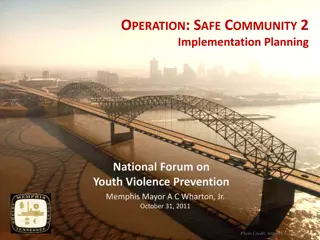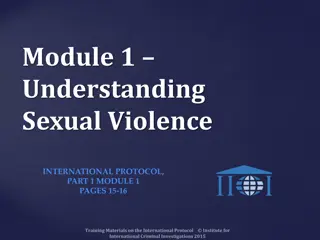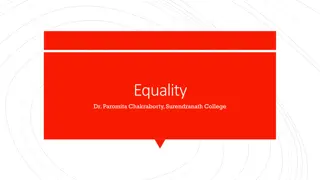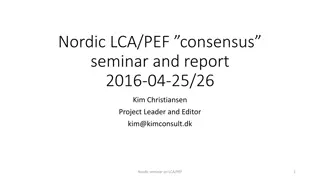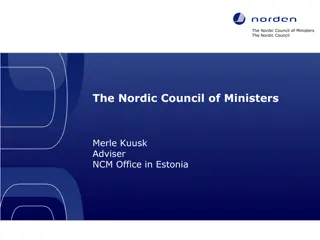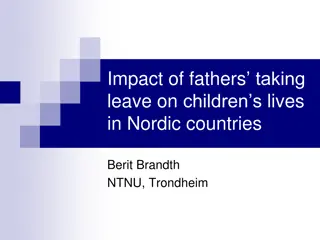Gender-Based Violence Prevention and Gender Equality in the Nordic Context
The discussion focuses on the prevention of violence against women in the Nordic countries, exploring the concepts of gender-based, gender-neutral, and gender-blind approaches. The Istanbul Convention is highlighted as linking violence to gender equality, emphasizing the importance of feminist perspectives. The narrative delves into the institutional responses to gender-based violence, considering the mainstreaming of feminist framings and the resistance to gender equality. It underscores the struggles over hegemony, resources, and state responsibility in shaping policies on violence. The article accentuates the need for a nuanced discussion on gender neutrality versus a gender perspective in addressing violence in the Nordic region.
Download Presentation

Please find below an Image/Link to download the presentation.
The content on the website is provided AS IS for your information and personal use only. It may not be sold, licensed, or shared on other websites without obtaining consent from the author. Download presentation by click this link. If you encounter any issues during the download, it is possible that the publisher has removed the file from their server.
E N D
Presentation Transcript
Gender based, gender neutral or gender blind prevention? Margunn Bj rnholt @mbjornholt Preventing Violence Against Women in the Nordic Countries Oslo March 8th 2018
1 The purposes of this Convention are to: a. protect women against all forms of violence, and prevent, prosecute and eliminate violence against women and domestic violence; b. contribute to the elimination of all forms of discrimination against women and promote substantive equality between women and men, including by empowering women Council of Europe Convention on preventing and combating violence against women and domestic violence paragraph 1 a and b.
Violence, gender equality and resistance The Istanbul convention links violence explicitly to (lack of) gender equality This can be seen as a recognition and mainstreaming of feminist perspective Increasing resistance and retrogression for women s rights internationally Growth of antifeminist movement In addition: old problems of resistance, low status, inadequate resources; duty to yield and benevolent contestations of gender equality policies Marginalisation and lack of resources for women s organisations Plus normal dangers of institutionalisation: depolitisation, goal distortion and cooptation
Institutionalisation, mainstreaming and resistance States institutional responses to gender based violence take place within two contradicting processes: on one hand feminism including feminist framings of GBV, has been increasingly legitimised and mainstreamed, as exemplified by the Council of Europe Convention on preventing and combating violence against women and domestic violence (Istanbul Convention). On the other hand, backlash and contestations of feminism and gender equality are increasing. Implications for how various actors are formed and potentially transformed in the process of institutionalisation, how various actors in the field are resourced, and how stakeholders are included or excluded in the interaction with the state in the formulation of policies on GBV. These processes may have gendered impacts.
Struggles over hegemony and resources and state responsibility Struggles over concepts, definitions and resources are a normal and legitimate part of democracy Choice of framing will inadvertently influence processes of inclusion and exclusion States need to be aware of their power and how their choice of framing, allocation of resources and interaction with various actors shape the field and various actors conditions for participation and success Important backdrop for discussion of gender neutrality vs gender perspective on violence in the Nordic context
What is the problem represented to be? (C. Bacchi) (framing matters) Prior to 1970s: social/drinking/mental health problem for marginal groups 1970s: gender problem, affecting women in all social groups The feminist framing, a strong and autonomous women s movements, in alliances with academics and state representatives, successfully transformed violence from a private problem into a political problem Changes in legislation, nationally and internationally, action plans, development of services Despite success, the feminist perspective has also been contested from the outset, also in the UN, with the health perspective as the main alternative
Different problematisations policies, stakeholders, actors and expertise, resource allocation and different blind angles different Gender problem: social and institutional causes, changing gender relations, addressing gender injustice, women s organisations, social scientists all disciplines including (but not exclusively) gender researchers, femocrats, practitioners, professionals, volonteers, shelters and shelter movement Criminal justice problem: persecution, prevention (of crime), social scientists,predominantly legal scholars, criminiologists, legal system, police, legal aid services (including civil/volontary sector) Health problem: risk factors, individual causes and consequences, treatment, health professions, health institutions, health bureaucrats, limited civil society? Economic problem: costs for society and individuals, has been used by advocacy groups as well as policymakers, but no field of actors and stakeholders Family problem: troubled families , risk factors, social work, anger management. Challenged by feminist approach. Is it being revitalised?
The Committee notes that, as a general rule, legislation adopted in Norway is gender-neutral. The Committee repeats its concern that gender neutral legislation, policies and programmes might lead to inadequate protection of women against direct and indirect discrimination, and hinder the achievement of substantive equality between women and men Committeeon the Elimination of Discrimination against Women (CEDAW) Concluding observations on the ninth periodic report of Norway, paragraph 12, first line
GREVIO has observed a number of causes and consequences of the loss of the gender narrative in the Danish response to violence against women. Group of Experts on Action against Violence against Women and Domestic Violence (GREVIO) Council of Europe, Baseline evaluation report Denmark
Gender neutral language and gender neutral policies in several Nordic countries Insider perspective: More inclusive; intersectional? Paradox of advanced gender equal countries . Moving beyond gender, no longer seeing the need for gender perspective, despite still being far from gender equal? CEDAW, GREVIO: critiques and worry
Norwegian gender neutral shelter law 2010 gender neutral and gendered Gender neutral law, strongly opposed by women s organisations, criticised in several academic articles and by CEDAW comitee Separate facilities for men and women + children independent right holders. Anne Hellum: Norway striking a balance, but a question of resource allocation Concern about organisational changes and shelters autonomy as many shelters had become municipal units (NOVA evaluation) CEDAW commitee concerned about inadequate estimation of the needs for shelters for women victims of violence compared to men and effects for women of shelter capacity A final question: future role of shelters and shelter movement in prevention and advocacy?
Take home message 1 .@mbjornholt @NKVTS Tension between gender mainstreaming and resistance important context for implementation of #IstanbulConvention to eliminate violence against women&all forms of discrimination against women #8mars #voldmotkvinner
Take home message 2 .@mbjornholt @NKVTS Tension between obligations to eliminate violence against women&all forms of discrimination against women #IstanbulConvention #CEDAW and gender neutral concepts, legislation and programmes #8mars #voldmotkvinner
Take home message 3 .@mbjornholt @NKVTS Loss of gender narrative might weaken political mobilisation against violence &4 gender equality #IstanbulConvention #CEDAW #8mars #voldmotkvinner
Take home message 4 .@mbjornholt @NKVTS Violence is multifaceted, need of multiple perspectives #gender #health #crime #economy #family & #intersectional approaches #gender #class #etnicity #sexuality #IstanbulConvention #8mars #voldmotkvinner
Take home message 5 .@mbjornholt @NKVTS States need to be aware of their power and how their framing, allocation of resources and interaction with various actors shape the field and various actors opportunities for participation and success #IstanbulConvention #8mars #voldmotkvinner
Thank you for listening! Margunn Bj rnholt margunn.bjornholt@nkvts.no @mbjornholt www.margunnbjornholt.no


